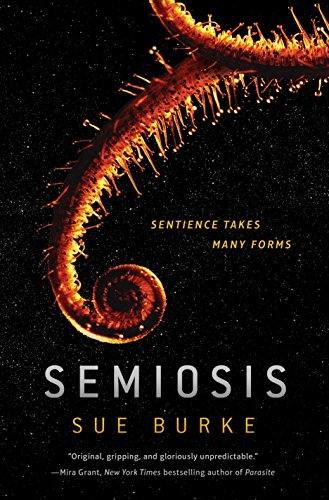Publisher:Tor Books (February 6, 2018)
SFRevu Link: http://www.sfrevu.com/php/Review-id.php?id=17715
Semiosis Website: https://semiosispax.com/
Semiosis is Sue Burkes’ debut novel, and it’s quite good. The term refers to the whole communications process between living things, and though it usually refers to intraspecies communication, the author ups the ante here. In Semiosis, colonists from a climate change and war-ravaged Earth must learn to get along with plants with opinions.
When the novel opens, the original 51 colonists have been weeded down to 31, and three have just been killed while on a food gathering expedition. The planet, named Pax by the hopeful humans, turns out to be at least as warlike as the one they left, but here the protagonists are plants, and as the group slowly comes to realize, they’re plants with comparable intelligence to the planet’s animals, many of which exist in close relationships with their vegetable overlords.
The humans must pick sides and learn how to work with the plants to survive if they don’t want to wind up collateral damage.
The story unfolds generation by generation as they discover previous colonist’s ruins and the plant that grew in its midst. Over the generations that plant develops the ability to communicate, beginning with nearly random color changes and progressing to written language. To me, it’s more an AI development tale than a colony tale, although there’s a fair amount of both as the plant, which they name “Stevland” after the first colonist to die, faces challenges and threats to the colony.
The tension between Stevland and the colonists come from its ability to manipulate the environment, making food more nutritious, addictive, or deadly as it suits its needs. They’re not totally dependent on it, but there’s a clear power imbalance and there’s no way to know how that will ultimately play out. Will Stevland wind up their future vegi-overlord, or become a responsible member of the colony?
Semiosis is told in first person, but that person changes each chapter. I often find that an annoying device, but here it works very well. Each chapter tells the story from one member of each successive generation’s viewpoint, and that allows us to examine inter and intra generational conflicts along with the external threats to the “Pacifists.”
Intelligent plant life may seem like a reach, but there are previous examples in science fiction, like the continent spanning creature in James White’s story “Major Operation” (1971), or, more recently, the mind controlling fungi in The Genius Plague (2017). In the real world there are a lot of examples of plants appearing to learn, and certainly sensing their environment, though it seems that Terran plants haven’t quite mastered consciousness yet. The quality of the author’s world building reminds me of James L. Cambias’ terrific debut novel A Darkling Sea (SFRevu Review), which also deals with the difficulties of communication between humans and others.
Semiosis is a solid debut by Sue Burke, and marks the start of a career worth watching.
